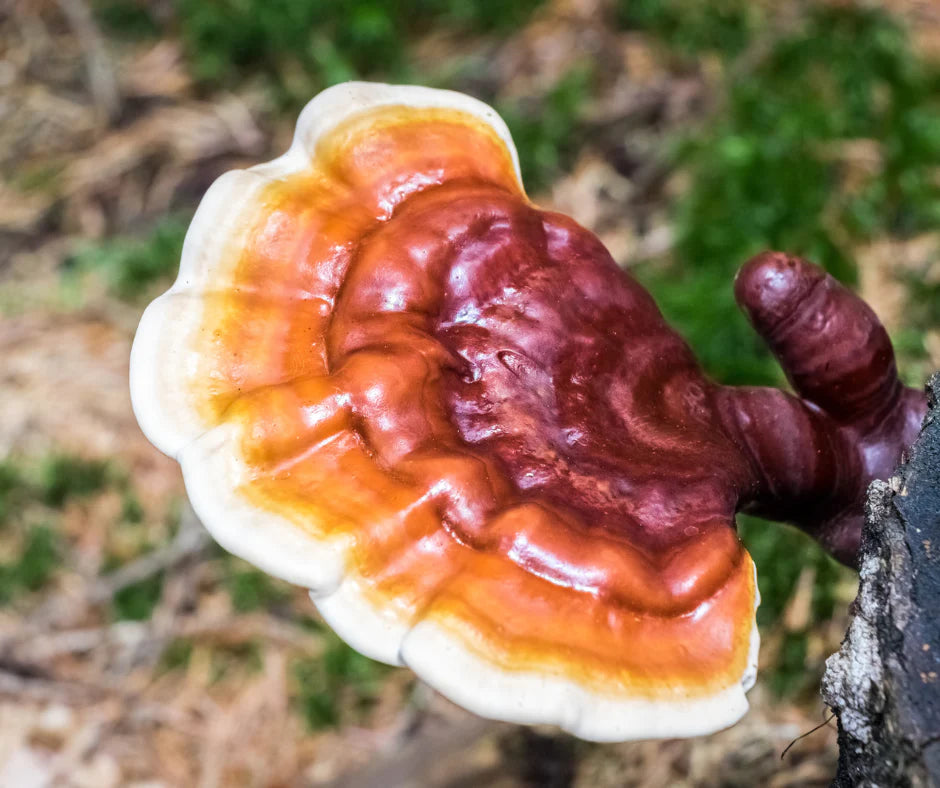Introduction
If you've ever marveled at the fascinating world of fungi, you've likely come across the term "super mushrooms." They've become a staple in health and wellness circles, known for their remarkable health benefits. But what makes them "super?" This in-depth article will delve into the extraordinary benefits of super mushrooms.
Super mushrooms, a group of fungi lauded for their impressive nutritional profiles, have sparked interest in wellness enthusiasts worldwide. Today, we delve into the offerings of six such super mushrooms: Red Reishi, Ganoderma Applanatum, Agaricus Blazei, Lion’s Mane, Cordyceps, and Turkey Tail.
Red Reishi: The Legendary Mushroom

Red Reishi, revered in traditional wellness practices, is known as a longevity mushroom. This super mushroom is thought to support immune function, with elements like polysaccharides and triterpenes believed to contribute to this attribute. Moreover, Red Reishi is also suggested to have stress management properties.
Ganoderma Applanatum: The Artist's Canvas

Ganoderma Applanatum, fondly termed the Artist's Conk, is celebrated for its potential antioxidant properties. This could have a supportive effect on the body's fight against free radicals. Furthermore, it is suggested that Ganoderma Applanatum can support the immune system.
Agaricus Blazei: The Brazilian Wonder

Agaricus Blazei, native to Brazil, is a super mushroom noted for its rich content of beta-glucans. These compounds are suggested to support overall health. Agaricus Blazei also appears to aid immune health and is linked with blood sugar management.
Lion’s Mane: The Brain's Ally

Lion's Mane has attracted attention for its possible brain-supporting properties. It is believed to contain compounds that could support memory and cognitive function. Additionally, Lion’s Mane has potential immune-enhancing and anti-inflammatory benefits.
Cordyceps: The Energy Companion

Cordyceps, a staple in traditional wellness practices, has earned a reputation as an energy-supporting mushroom. It is suggested to help manage fatigue, earning its popularity among fitness enthusiasts. Apart from its potential energy-enhancing benefits, Cordyceps is also suggested to support immune function and respiratory health.
Turkey Tail: The Immunity Supporter

Turkey Tail stands out for its potential immune-boosting attributes. It's suggested that this mushroom, rich in polysaccharides, might help support the immune system. Moreover, Turkey Tail could also support gut health.
Incorporating Super Mushrooms into Your Diet
These super mushrooms can be a nutritious addition to your meals or consumed as teas or dietary supplements. As always, sourcing from reliable suppliers is key to ensure you're receiving high-quality products.
Conclusion
Red Reishi, Ganoderma Applanatum, Agaricus Blazei, Lion’s Mane, Cordyceps, and Turkey Tail, each offer unique nutritional benefits, supporting various aspects of health from immune function to energy levels. As we navigate the world of super mushrooms, it becomes clear that these fungi could be powerful allies on our health journey. Nonetheless, they are part of a larger wellness picture and not a sole solution. Always seek advice from your healthcare provider before adding new supplements to your diet, and continue to embrace a balanced lifestyle.
At Vibra360 we incorporate some or all of these powerful super mushrooms into our products. Be sure to visit our "Shop" section to browse our incredible product line.
Here are some sources that provide additional insight into the benefits of these super mushrooms:
-
Wachtel-Galor, S., Yuen, J., Buswell, J. A., & Benzie, I. F. F. (2011). Ganoderma lucidum (Lingzhi or Reishi): A Medicinal Mushroom. In Herbal Medicine: Biomolecular and Clinical Aspects. 2nd edition. CRC Press/Taylor & Francis. https://www.ncbi.nlm.nih.gov/books/NBK92757/
-
Grienke, U., Zöll, M., Peintner, U., & Rollinger, J. M. (2014). European medicinal polypores—a modern view on traditional uses. Journal of Ethnopharmacology, 154(3), 564–583. https://doi.org/10.1016/j.jep.2014.04.030
-
Firenzuoli, F., Gori, L., & Lombardo, G. (2008). The Medicinal Mushroom Agaricus blazei Murrill: Review of Literature and Pharmaco-Toxicological Problems. Evidence-Based Complementary and Alternative Medicine, 5(1), 3–15. https://doi.org/10.1093/ecam/nem007
-
Mori, K., Inatomi, S., Ouchi, K., Azumi, Y., & Tuchida, T. (2009). Improving effects of the mushroom Yamabushitake (Hericium erinaceus) on mild cognitive impairment: a double-blind placebo-controlled clinical trial. Phytotherapy Research, 23(3), 367–372. https://doi.org/10.1002/ptr.2634
-
Tuli, H. S., Sandhu, S. S., & Sharma, A. K. (2014). Pharmacological and therapeutic potential of Cordyceps with special reference to Cordycepin. 3 Biotech, 4(1), 1–12. https://doi.org/10.1007/s13205-013-0121-9
-
Jiang, S., Du, P., An, L., Yuan, G., & Sun, Z. (2017). Polysaccharides from Trametes versicolor enhance the immune response and antitumor activity in mice with hepatocellular carcinoma. Journal of Ethnopharmacology, 205, 1–7. https://doi.org/10.1016/j.jep.2017.04.032
